Who to Barbecue When Your Church Makes a Mistake
Some time back a small church found itself in trouble because of a rather large mistake. With people looking for a way out, someone suggested fire.
by Bob Kerstetter
Some time back a small church found itself in trouble because of a rather large mistake. This sort of predicament no doubt bedevils multiple congregations seeking growth. It may emerge from an appetite for change, or, perhaps, the simple desire for something new on the menu.
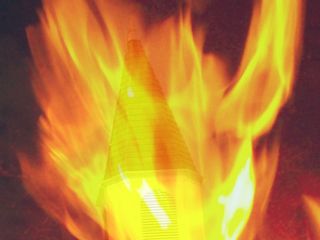 Whatever the reason—the story here is not to blame—the dilemma originated within a building program. The difficulty was neither paint, nor pews, nor carpet, nor kitchen appliances—all of these being perfectly capable of spawning destruction within the Body of Christ. “The problem,” says Nancy, a church member, “was the cost.”
Whatever the reason—the story here is not to blame—the dilemma originated within a building program. The difficulty was neither paint, nor pews, nor carpet, nor kitchen appliances—all of these being perfectly capable of spawning destruction within the Body of Christ. “The problem,” says Nancy, a church member, “was the cost.”
“The cost,” fellow church member Bob agrees, “was way too expensive. We simply could not pay the price.”
While this could be viewed as a planning issue, the new building stood delivered, so the trouble was real. “Our debt was huge,” affirms Ed, another church member. The building had created a mega financial problem for the 125 parishioners.
With people looking for a way out, someone suggested fire as a solution.
The idea felt right to a core group within the church, so they pushed the plan. Soon, the wider congregation conspired together. Someone called a contractor in Georgia who assembled the gear. This was clearly an expert who lived in a quiet, out-of-the-way town in the southern part of the state, less than one hour of fast driving from the Atlantic coast. The church needed someone very familiar with solving these types of problems by using fire.
When the gear arrived it proved simple to operate, using technology appropriate for the task. Starting fires required the use of propane, charcoal and wood, all easily accessible. “No one used lighter fluid to start these fires,” says Bob. “Some said it leaves a trace.” Fire and smoke fed into a pair of parallel solid-steel cylinders. If necessary, additional fire could openly burn at the front. Satisfied with their purchase, the leaders placed the equipment at the center of their operation destined to produce Holy Smoke. If the plan worked out for the church, their new-building financial woes would become much less of an issue and possibly disappear.
Holy Smoke was a Success. And so it Continues.
Bob, Nancy and Ed all credit the operation with reducing their new-building debt by 50 percent in five years. Bob says all of the payoff from the operation goes to debt relief. “Holy Smoke is a ministry,” he explains. Besides generating new-building debt relief, Holy Smoke creates ministry opportunities anywhere within two hours driving time of Canton, North Carolina, USA.
The gear from Georgia is a custom-built smoker trailer constructed by Lang BBQ Smokers. “Each cylinder contains two smoking trays,” explains Bob who also works as a volunteer barbecue judge. “Each tray can hold 12 Boston Cuts.” When operating at full capacity with 48 cuts, the pork output of the smoker weighs several hundred pounds. In addition to pork, the church volunteers smoke turkey, chicken and beef. Plus they make coleslaw and baked beans.
“We attend street festivals in the summer and fall,” says Ed. “During the rest of the year we cater events.” Nancy says the church—St. Andrews Episcopal, Canton, North Carolina—will travel up to two hours to cater weddings, birthdays and other types of events. The volunteers also cook meals for holidays such as Thanksgiving.
Nancy, Bob and Ed discussed Holy Smoke while preparing meat and serving meals—along with 10 or so other volunteers—during the 28th Annual Church Street Art & Craft Show in Waynesville, North Carolina. None of the volunteers wished to claim credit for their work, instead giving kudos to the entire team, plus those back home. “Everyone comes and works,” says a volunteer who wished to remain unidentified. The Holy Smoke people of St. Andrews Episcopal are solving their problem by working together.
Visit the church website for information about Holy Smoke.
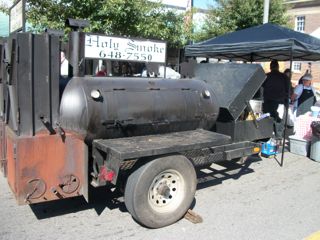
The Holy Smoke trailer—custom built by Lang BBQ Smokers in Nahunta, Georgia.
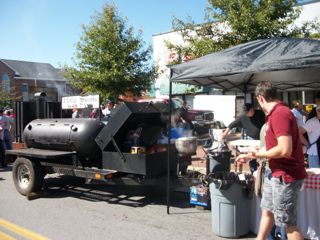
Holy Smoke BBQ at a street festival in Waynesville, North Carolina.
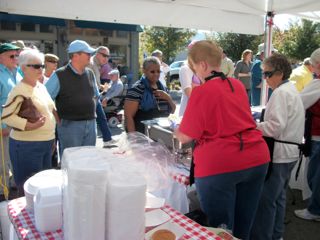
The Holy Smoke serving line.
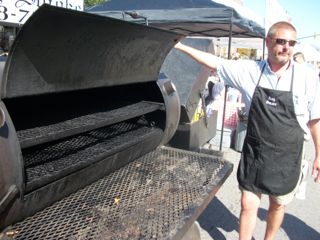
The smoking shelves in the Holy Smoke trailer.